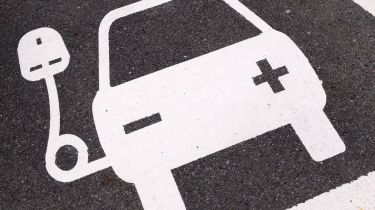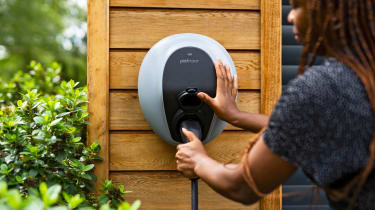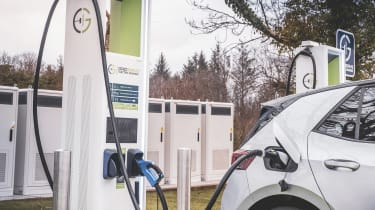How much does it cost to charge an electric car?
How much it costs to run an electric car, how long EVs take to charge, and where you can do it

The impending ban on the sale of brand new petrol and diesel-powered cars due in 2030 may already have you thinking about switching to an electric vehicle (EV) or plug-in hybrid (PHEV) in the near future. But how much do EVs cost to charge in the UK and how much could you save by making the switch to an electric car now?
 The 10 best electric cars in 2026
The 10 best electric cars in 2026
There are many ways to charge an electric car and the cost will vary depending on your choice of energy provider and your tariff. Other influencing factors on EV charging costs include the speed and power of the charger, and the size of the vehicle’s battery.
Here, we take a look at how much it’ll cost you to charge an electric car, plus we delve a little deeper into whether or not it’s cheaper to run an EV than it is a petrol or diesel car.
Charging an electric car at home: three-pin plug
While not recommended as such, you can charge your electric car with a conventional three-pin plug at home. It will take a long time because the power from a domestic wall socket is relatively low, so it’s best reserved for emergency charging away from home, and for cars with reasonably modest battery sizes.
The average home electricity rate costs around 30p per kWh (as of August 2023), meaning it would cost you roughly £12 and take 16-17 hours to charge a Nissan Leaf with its 40kWh battery. That equates to roughly 7p per mile, if you take the manufacturer’s 168-mile claim as gospel.
Importantly, if you sign up for an EV-specific energy tariff with off-peak overnight rates, you could slash that cost by a third. That’s less than £4 for a full battery or 2.3p per mile. Bear in mind that these rates often only last for six or seven hours, however, so you’ll pay more if you charge outside of the predefined times.
It’s worth shopping around or asking your energy provider what deals they can provide. EV forums often discuss which tariffs are cheapest, with owners sharing their experiences.

Home wallbox charger
A much faster option is a wallbox charger, offering speeds of around 7kW, which can give EVs with modest batteries a full charge in six to seven hours. After the initial installation, you can charge your car in less than half the time it takes with a three-pin plug. The cost to charge is unaffected; you could still charge a Nissan Leaf for less than £4 on the most affordable energy tariffs.
Previously, the Electric Vehicle Homecharge Scheme (EVHS) provided a government funded grant for up to 75% of the cost of a wallbox installation for potential savings of £350, but this scheme ended in April 2022. Those living in rental properties or flats may still be eligible for the funding, but hurdles such as a need for dedicated parking and landlord agreement mean it’s not as simple as installing a charger in your own home.
It’s worth noting that some home wallbox providers will advertise 11kW or 22kW chargers, but these both require three-phase electrics, which is uncommon in the UK. Be sure what type of circuitry you have at home – as well as checking if your EV is capable of accepting these speeds – before committing to one of these quicker charge points.
Public electric car chargers

The cost of charging your car in public depends on the network – just the same as it does when filling your car with petrol or diesel. Free-to-use chargers are becoming harder to come by, but some supermarkets, hotels and other public venues still offer this as a perk. They’re usually oversubscribed, however, so we wouldn’t rely on this method of charging.
You’ll find prices vary quite wildly for those you do have to pay for, but rules and regulations introduced recently dictate that all chargers offering speeds of 8kW or more must offer contactless payment solutions. But some will reward you with cheaper rates if you sign up for a subscription.
Some of the biggest charge point operators (CPOs) include BP Pulse (formerly known as Polar), Gridserve (previously Ecotricity), InstaVolt and Shell Recharge, plus Tesla’s well-regarded Supercharger network. You can read more about these – including price breakdowns – on our sister site DrivingElectric.com.
As a general rule, ‘fast’ charge points (speeds of between 7kW and 22kW) require you to bring your own cable. ‘Rapid’ and ‘ultra-rapid’ CCS and CHAdeMO chargers of 50kW or more have a toughened cable attached to the unit.

So, how much will it cost to charge my electric car? Using BP Pulse as an example, you’ll quickly discover there are myriad ways to pay – as well as different prices for the various charger types. If you sign up to the BP Pulse subscription service, you pay a monthly fee of £7.85 (with one month free and up to £45 charging credit) for access, including a discount on the cost per kWh to use their charging stations. In general, the faster the charging speed, the higher the cost per kWh.
- Fast points (7-22kW): 44p/kWh
- Rapid points (43-50kW): 63p/kWh
- Ultra-rapid 150 kW+ points: 69p/kWh
You can also use a free to access pay-as-you-go membership, accessed via the company’s smartphone app. This costs more than the full subscription service (above), but less than paying via contactless credit or debit card (below).
- Fast points: 59p/kWh
- Rapid points: 77p/kWh
- Ultra-rapid points: 83p/kWh
As mentioned, BP Pulse also offers a contactless card payment that allows you to pay without using the app or having a subscription, and the rates are as follows.
- Fast points: 59p/kWh
- Rapid points: 79p/kWh
- Ultra-rapid points: 85p/kWh
Charging networks and independent websites like Zap Map offer Electric car charging cost calculators, which can make it easier to work out how much public charging will cost you.

Costs of motorway charging
National price fluctuation is rare for each individual network, and you’ll not necessarily pay more at a motorway service station. Some networks will put a holding fee on your card to authorise a charge though, so if this is likely to cause problems, downloading the app and adding credit to your account usually allows you to top-up without any additional costs.
The Gridserve Electric Highway network has charge points at all service stations across the UK’s motorway system. There’s no membership fee and the cost to charge your electric car is currently 69p/kWh.
Using a 50kW rapid charger, you could charge a Nissan Leaf from 20-80% in roughly an hour, though some newer models like the Hyundai Ioniq 5 and Kia EV6 will perform the same task in a fraction of that time. Regardless, once you’ve popped inside to use the facilities and grab a coffee, your electric car should’ve charged sufficiently for you to get back on your merry way.
Are EVs cheaper to run than petrol or diesel cars?
We’ve discussed the cost per mile for charging at home. For comparison, should you decide to charge a Nissan Leaf using BP’s ultra-rapid chargers – without a subscription, at a rate of 85p/kWh – it would cost you just over £33 for a full battery – or roughly £20 for a 20-80% top up. That translates to almost 20 pence per mile – nearly three times what you’ll pay if you topped up solely at home.
Running a petrol or diesel car capable of 51mpg and paying £1.45 per litre for fuel, you’re looking at roughly 13 pence per mile. That’s almost double the cost of home charging, but significantly less than if you only ever used the most expensive chargers to refill your EV.
Factor in the higher purchase price of an EV, and it’s not a dead cert that your fancy new zero-emission model will be cheaper to run than your old diesel. Company car tax rates are favourable though, and there are other perks – like free road tax and low-emission zone exemptions – that could work in your favour.
In short, an electric car can be much cheaper to run, but you’ll need to be savvy about how and where you top up.
Check out our complete guide to electric car charging stations...
Recommended

New Subaru Trailseeker revealed as rugged electric SUV with 375bhp

New Subaru Solterra brings more range, power and polish
Most Popular
Tips & advice

Car dashboard warning lights: what does each symbol mean?

Electric car charging stations: public networks, charger types, apps and maps








